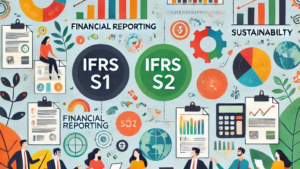 For years, sustainability reporting in Nigeria has been seen as a compliance burden rather than a strategic business tool. Many organisations have approached environmental, social, and governance (ESG) disclosures with a checkbox mentality, driven by regulatory requirements rather than a commitment to long-term value creation. However, the introduction of IFRS S2 (Climate-Related Disclosures) is shifting this perspective.
For years, sustainability reporting in Nigeria has been seen as a compliance burden rather than a strategic business tool. Many organisations have approached environmental, social, and governance (ESG) disclosures with a checkbox mentality, driven by regulatory requirements rather than a commitment to long-term value creation. However, the introduction of IFRS S2 (Climate-Related Disclosures) is shifting this perspective.
No longer just a compliance requirement, IFRS S2 presents an opportunity for Nigerian businesses to enhance financial resilience, attract investors, and future-proof their operations. At CSR-in-Action, we help organisations understand how integrating sustainability into their corporate strategy is not just about meeting regulations—it is about gaining a competitive edge in an evolving market.
What is IFRS S2, and Why Does it Matter for Nigerian Businesses?
IFRS S2 is one of the new global sustainability disclosure standards issued by the International Sustainability Standards Board (ISSB), specifically focused on climate-related financial disclosures. It builds on the recommendations of the Task Force on Climate-related Financial Disclosures (TCFD), requiring companies to report on:
- Governance – How climate-related risks and opportunities are managed at the board and executive levels.
- Strategy – How climate change affects business models, financial performance, and future planning.
- Risk Management – How climate risks are identified, assessed, and mitigated.
- Metrics and Targets – Quantifiable climate-related data, including greenhouse gas (GHG) emissions and transition plans.
While IFRS S2 is not yet mandatory in Nigeria, it is rapidly being adopted worldwide, and major investors are aligning their funding criteria with these standards.
For Nigerian companies, the question is no longer whether they should prepare for IFRS S2—but how quickly they can leverage it for competitive advantage.
The Business Case for IFRS S2: Beyond Compliance
Many Nigerian companies view sustainability reporting as a costly obligation. However, research and global case studies show that IFRS S2 adoption can drive profitability, reduce financial risks, and unlock new investment opportunities.
1. Attracting Local and International Investors
Global investors are increasingly prioritising ESG-compliant businesses, with over $40 trillion in ESG-aligned assets under management. Nigerian companies that embrace IFRS S2 will:
- Gain better access to international funding from climate-conscious investors.
- Improve their credit ratings and loan terms by demonstrating climate resilience.
- Stand out in a competitive financial market where sustainability is a growing differentiator.
For example, Access Bank, a leader in Nigerian sustainable finance, successfully raised a $50 million green bond by aligning with international sustainability standards.
2. Strengthening Risk Management and Business Resilience
Climate-related risks—such as flooding, droughts, and supply chain disruptions—are not abstract threats; they are immediate business risks for Nigerian industries.
- The agriculture sector faces lower yields due to unpredictable weather.
- The real estate sector must address rising insurance costs from climate disasters.
- The energy sector is transitioning toward renewables to stay competitive.
By implementing IFRS S2’s risk management framework, companies can:
- Identify and mitigate risks early, preventing financial losses.
- Develop climate-adaptive business strategies, ensuring long-term survival.
- Enhance operational efficiency, reducing waste and energy costs.
3. Strengthening Brand Reputation and Consumer Trust
Consumers are becoming more climate-conscious, and businesses with strong sustainability commitments are gaining a competitive advantage.
A Nielsen report found that 73% of consumers prefer to buy from companies that demonstrate strong environmental and social responsibility. Nigerian businesses that integrate IFRS S2-aligned climate disclosures will:
- Enhance customer loyalty by showcasing environmental responsibility.
- Differentiate themselves from competitors who lag behind on sustainability commitments.
- Improve stakeholder trust, reducing the risk of greenwashing accusations.
- Gaining First-Mover Advantage in Regulatory Compliance
Again, IFRS S2 is not yet mandatory in Nigeria. However, businesses that prepare early will avoid last-minute regulatory pressure.
- The Nigerian Stock Exchange (NGX) has already introduced ESG disclosure guidelines.
- The Central Bank of Nigeria (CBN) requires financial institutions to integrate sustainability into their risk management.
- The Petroleum Industry Act (PIA) mandates ESG considerations for oil and gas companies.
Companies that align with IFRS S2 today will:
- Stay ahead of upcoming regulations, avoiding potential fines.
- Position themselves as industry leaders, setting the standard for sustainability in Nigeria.
- Make regulatory reporting easier, since IFRS S2 aligns with other ESG frameworks.
CSR-in-Action’s Role in Helping Businesses Transition to IFRS S2
At CSR-in-Action, we have worked with leading Nigerian businesses to:
- Develop sustainability reports that align with global standards.
- Integrate climate risk management strategies into corporate governance.
- Train leadership teams on how to leverage sustainability for business growth.
- Provide assurance services to validate sustainability reports for investor confidence.
The transition to IFRS S2 is not just about compliance—it is about ensuring Nigerian businesses remain globally competitive.
Is your organisation ready to embrace IFRS S2 and turn sustainability reporting into a business advantage? Let CSR-in-Action guide you through the process.
References
IFRS S2 Climate-Related Disclosures Overview – https://www.ifrs.org/projects/work-plan/climate-related-disclosures/

